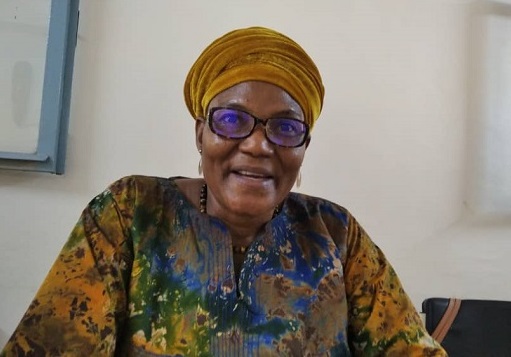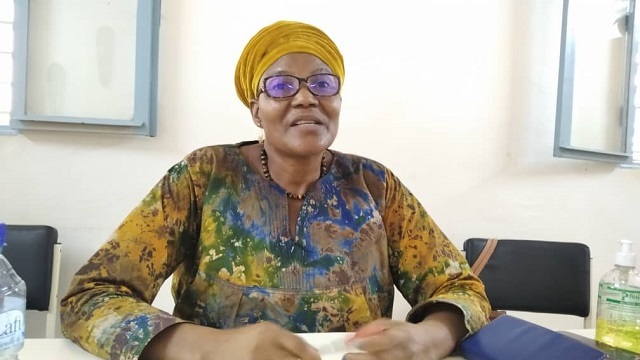In this interview with the online media, Minesactu.info, Annonciata Thiombiano, a geographer by training and a specialist in occupational health and safety and the environment in the mining sector, talks openly about the mining sector and women in Burkina Faso. She is an expert in the field, with nearly 16 years’ experience. Now a consultant with a firm and mining drilling companies, she is also Secretary General of the Association of Women in the Mining Sector of Burkina Faso (Association des Femmes du Secteur Minier du Burkina, AFEMIB). Read on!
Minesactu.info: Can it be said today that the number of women in the mining sector has increased?
Annonciata Thiombiano (AT): Yes, just last 15 June (2023), the Director General of Mines noted this in his speech during a webinar that AFEMIB hosted. He said that if we compare the statistics for the presence of women in positions of responsibility in the mining sector worldwide, which is around 17%, Burkina Faso, with 16%, is rated rather highly in terms of the presence of women in the sector. So we can say that we are well placed in the world.
In which areas are there more women in the mining sector?
In terms of composition by sector of activity, taking into account women in mining companies and subcontractors, we can see that they are more likely to be found in the administrative sector (35.04%) than in operations (9.79%), according to 2022 data from the Directorate General of Mines and Geology (Direction Générale des Mines et de la Géologie, DGMG). There are natural explanations for this. For example, on the administrative side, in accounting, human resources and a number of support services, women are needed more. Now, when we look at the technical sector, at operations level, for example in the fleet, in the driving of machinery, there is an increasing preference for women, but the statistics are still low (2.8%), including subcontractors.) Because we realise that the way we drive the same model of machine is different for men and women. Wear and tear is not the same. The machine driven by a woman is better looked after and better preserved than the one used by a man. So, more and more, in the driving of dumpers and large machines, women are being favoured more and more, and this is visible even beyond Burkina Faso, on a global scale. However, it should be noted that there are few competent women at this level.

As a women’s association promoting the professional integration of women in the mining sector, do you manage to find jobs for women in this field?
Yes, but not in a formal way. We have meetings that allow members to build up a substantial address book, which often opens doors to jobs. For example, some of our colleagues have been appointed to positions of responsibility this way. We also work with students who want internships, and we try to help them find internships. We’re doing this because we were supposed to sign a partnership agreement with the Chamber of Mines to be able to do this, but we don’t have the tools. So far, however, some of our members have been able to gain access to jobs thanks to our efforts. We do not fail to plead the cause of women with companies, but this is done informally. The formal process is under way, but it is not yet complete.
Today what are the major challenges that need to be overcome if we are to reach perhaps 30% of the mining workforce?
Perhaps it’s a question of encouraging women to find out first what jobs they can find in the mines, to like them and then to go into these fields, do the training and try to have all the skills required to work in these areas. Otherwise, there’s no favouritism.
Some people say that if you’re a woman, you either know someone, or you give yourself up to be recruited in a mine. As a women’s association defending women, what comment do you make on these statements?
As you say, in all sectors of activity, there are always these prejudices. There’s nothing extraordinary about the mining sector. Everything that happens in other sectors also happens in the mining sector. Although now that the inclusion of women has become a global issue, there is hope that there will be even more women in this sector. Some organisations even specify in their calls for applications that female candidates are encouraged to apply. At times, when skills are equal, women are given preference.
As for what people are saying about giving themselves up to get a job, there’s a Code of Conduct that all the structures have signed up to and that everyone is obliged to respect. There are measures in place to combat bad practices. It’s true that there are some black sheep, but you have to apply like everyone else. And if you’re lucky, you’ll be selected. There’s nothing special about the mining sector. It’s the same everywhere, and even in the civil service, it’s often said that if you don’t drop a stone, your case won’t be considered. But we meet people who are accepted without any intervention. It’s because there’s more demand than offer that makes the choice difficult. My advice to people is that they need to be well prepared for the sector they want to work in. Most mining companies are quoted on the stock exchange and they don’t play around with work, and they won’t allow incompetent people on their team. It’s the results that count. Technical skills account for 20% (hard skills), and personal behaviour (soft skills) for 80%. So we need to work on behaviour, interpersonal skills and our way of being. A degree alone is no longer enough, and if you go through the back door, it will catch up with you. It’s a very selective field and excellence is highly sought after. It’s not about being a woman or a man, it’s about having the right skills. The choice is made on the basis of skill, and if you have the same skills as a man, a woman can get in. So there are some people who think that all you need to be is a woman, and since we favour women, we’ll favour them. We’ll give you first preference provided that you’re equally competent with the man. Otherwise, if the man is more competent than the woman, the man will be chosen.
It’s true that we’re talking about the emancipation of women in all sectors of activity. Are there any areas of mining where women cannot work?
No, I don’t think so. Women can work in all areas of mining. The only problem is that there are situations that are just exceptional in terms of their maternity and there are areas where, when a woman is pregnant, she can no longer do her job. She is put in another area until she gives birth, before returning to work so as not to expose the life of the child, because there is no such thing as zero risk. Otherwise, they can do any job as long as they are competent. On top of that, there are exceptions. Mining drilling, for example, is a very difficult field, and so far I haven’t seen any women in Burkina Faso who are drillers or assistant drillers.
Any last words?
What I can add is that when you’re a young girl or boy, you have to be curious about the fields that are open to you. Because generally, we get caught up in trends or we choose fields that work, and everyone goes there because it works. Above all, you have to choose subjects that you like. Because if you don’t like a subject, you can get a degree without succeeding in that subject because your heart isn’t in it. When you love something, you’re prepared to do anything and put in the effort. Willpower is based first and foremost on the love you have for the thing. And when you do something out of love, out of passion, you never see the difficulties. You have to love work in general, and love mining work in particular, which can take up to 12 hours a day.
Interview by Sidi Béwendé
#Mines_Actu_Burkina










